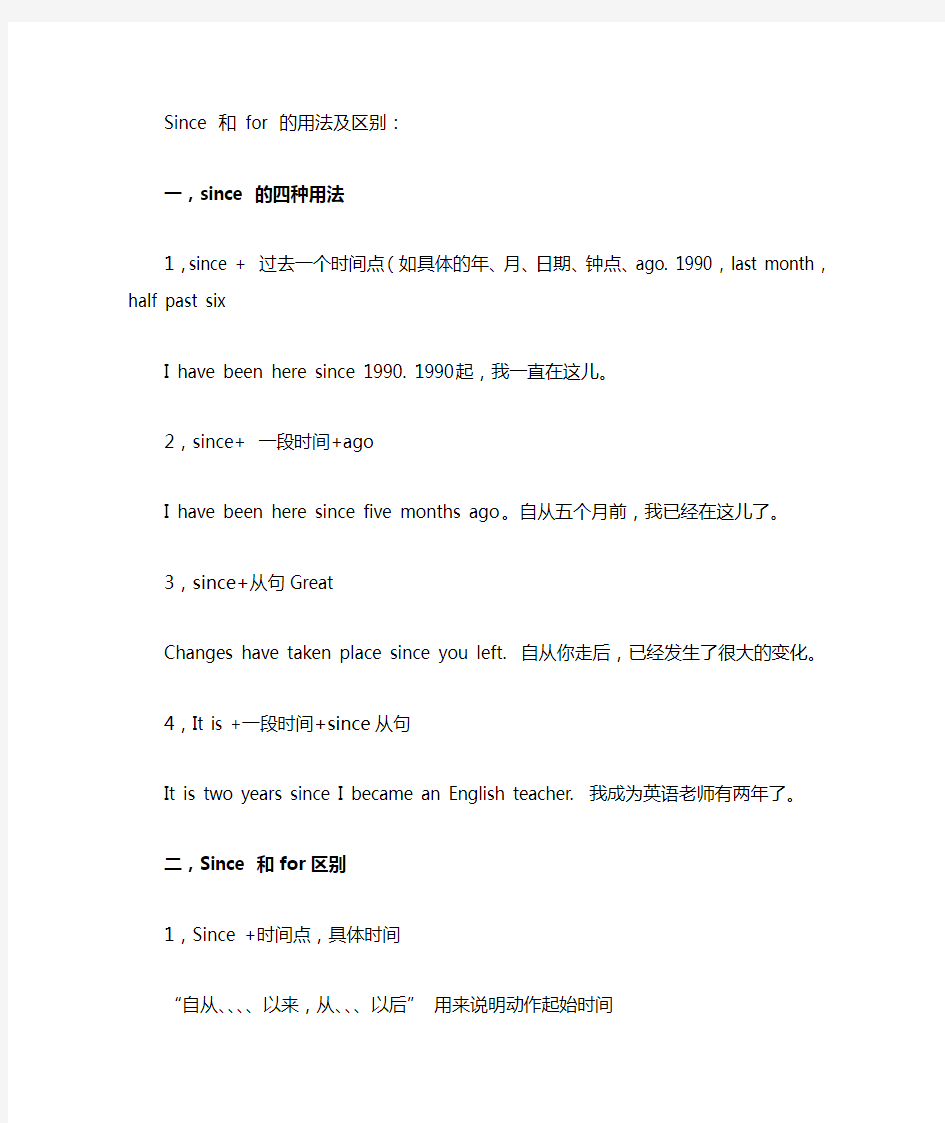
Since 和 for 的用法及区别
- 格式:doc
- 大小:76.00 KB
- 文档页数:7


Since 和for 的用法及区别:
一,since 的四种用法
1,since + 过去一个时间点(如具体的年、月、日期、钟点、ago. 1990 , last month , half past six I have been here since 1990. 1990起,我一直在这儿。
2,since+ 一段时间+ago
I h a v e b e e n h e r e s i n c e f i v e m o n t h s a g o。自从五个月前,我已经在这儿了。
3,since+从句Great
Changes have taken place since you left. 自从你走后,已经发生了很大的变化。
4,It is +一段时间+since从句
I t i s t w o y e a r s s i n c e I b e c a m e a n E n g l i s h t e a c h e r.我成为英语老师有两年了。
二,Since 和for区别
1,Since +时间点,具体时间
“
自
从
I have been in Beijing since 2010.
、以来,从、、、以后”用来说明动作起始时间
2,For + 时间段,用来说明动作延续时间长度,因此句中的谓语动词,也应该是延续性动词。
I have been in Beijing for one year。
We have learnt English for about three years.
I have been here for 3 days. (对)
I have arrived here for 3 days.(误)
三,延续性动词和终止性动词的概念
英语中,动词按其动作发生的方式、动作发生过程的长短,可分为延续性动词和终止性动词。
延续性动词
表示能够延续的动作,这种动作可以延续下去或产生持久影响。如:
learn, work, stand, lie, know, walk, keep, have, wait, watch, sing, read, sleep,
live, stay等。
终止性动词
也称非延续性动词、瞬间动词或短暂性动词,表示不能延续的动作,这种动作发生后立即结束。
如
open, close, finish, begin, come, go, arrive, reach, get to, leave, move, borrow,buy等。
四、延续性动词的用法特征
1.延续性动词可以用于现在完成时,其完成时态可与表示"段时间"的状语连用。表示"段时间"的短语有:for two years, during the past three years, since last year, how long 等
I have learned English since I came here. 自从我来到这儿就学英语了。
2.延续性动词不能与表示短暂时间的"点时间"状语连用。
如:It raind at eight yesterday morning . (误)
rain为延续性动词,而at eight表示"点时间",前后显然矛盾。如果用延续性动词性动词来表示一瞬间的动作,可借助come begin get等终止性动词来表示。
上句可改为:It began to rain at eight yesterday morning.(正)
又如:
-When did you get to know Jack?
-Two years ago.
-Then you've known each other for more than two years.
-That's right.
五、终止性动词的用法特征
1.终止性动词可用来表示某一动作完成,因此可用于现在完成时。如:The train has arrived.火车到了。
Have you joined the computer group?你加入电脑小组了吗?
2.终止性动词表示的动作极其短暂,不能持续。因此,不可与表示一段时间的状语用(只限肯定式)。
如:
(1)他死了三年了。
误:
He has died for three years.
正:
He has been dead for three years.
正:
He died three years ago.
正:
It is three years since he died.
正:
Three years has passed since he died.
(2)
他来这儿五天了。
误:
He has come here for five days.
正:
He has been here for five days.
正:
He came here five days ago.
正:
It is five days since he came here.
正:
Five days has passed since he came here.
句中终止性动词转换为相应的延续性动词,如上面两例中的第一种正确表达方式。
下面列举几例:
leave→be away, borrow→keep, buy→have, begin/start→be
on, die→be dead, move to→live in, finish→be over, join→be in/be a member
of, open sth.→keep sth. open, fall ill→be ill, get up→be up, catch a cold→have
a cold
。